hankyoreh
Links to other country sites 다른 나라 사이트 링크
‘If you’re worried about the Chinese threat, get closer to China’
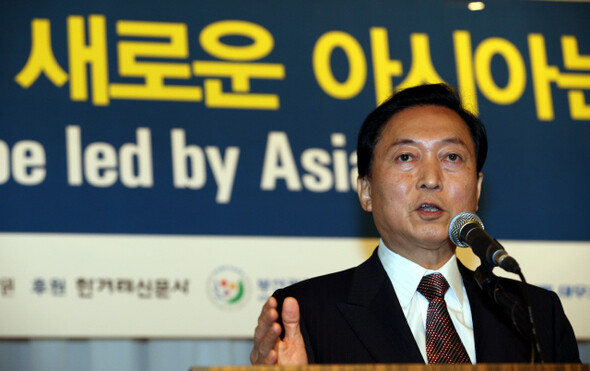
“If you’re worried about the Chinese threat, that means you ought to get closer to China.”
This was the message from former Japanese Prime Minister Yukio Hatoyama at a round-table discussion following his keynote address at the Hankyoreh-Busan International Symposium on Nov. 19. His remarks read as a rebuke against the current Shinzo Abe administration, which he said has only amplified regional security risks with his recent push to assert collective self-defense authority and revise its defense cooperation guidelines with the US.
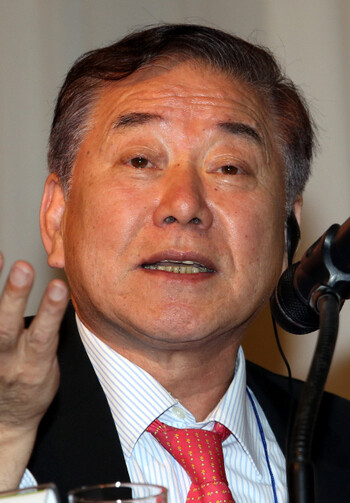
“There is obviously such a thing as a China threat,” Hatoyama said at the discussion moderated by Yonsei University professor Moon Chung-in. “We’re seeing double-digit growth in [China’s] military power every year.”
“But Japan shouldn’t be beefing up its military cooperation with the US just because it’s scared of China. It’s important for Tokyo to cooperate more closely with Beijing and remove the potential threats through dialogue, without relying on military strength,” he advised.
Hatoyama went on to say that “a permanent security system would be ideal.”
“If there’s an urgent crisis situation, you can appeal to the US for help, but otherwise the right approach for the times would be a basic withdrawal of US forces,” he added.
But some speakers voiced concerns that USFJ pulling out could lead Japan to beef up its own military.
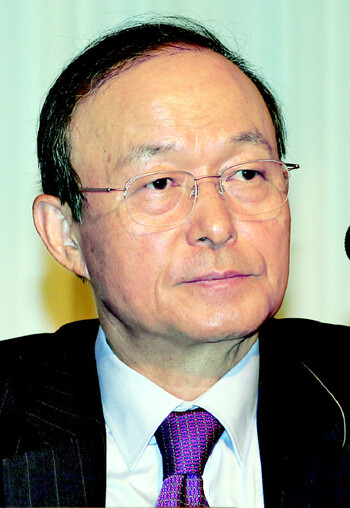
“The right approach is to reduce the military after the threat has been reduced,” advised Song Min-soon, a former South Korean Minister of Foreign Affairs and Trade and one of the discussants.
“The other countries in the region believe that if USFJ pulls out, Japan is going to make up the difference by increasing its own military strength,” Song explained.
“Security isn‘t something that can change overnight. It changes over the long term,” he added.
“USFK and USFJ need to be present at the right scale. I don’t expect there will soon come a time even after the Korean Peninsula is reunified that we won’t need the US military,” Song continued.
Discussants also addressed what they called the growing militarism of Japan under the Abe administration.
“The direction of the Abe administration seems to me one where they are pursuing a militarist state, and prioritizing the state over the people,” said Hatoyama.
“We ought to be pursuing a state that gives sovereignty to the public, not a militarist or statist one,” he cautioned.
Hatoyama went on to quote Richard von Coudenhove-Kalergi, an Austro-Hungarian philosopher whose works were translated in Japan by former Prime Minister Ichiro Hatoyama, his grandfather.
“The state is a means, not an end. If the goal is to achieve humanity, it is better not to have the state,” the quote read.
Song raised concerns about the Special Secrecy Law and other Japanese legislation to ramp up government controls on information.
“My worry is that we’re seeing a neo-Hegelian emphasis on the state over individual character, and in Japan no less,” he said.
“The worst of this trend is in North Korea, and China’s one-party dictatorship prioritize the state. If Japan does that too, then it is difficult to see any future for Asia,” he cautioned.
Moon noted the presence of critics in Japan arguing that China can’t control its People‘s Liberation Army the way Japan did with its militarism in the 1930s.
“But in China, they’re saying that the Abe administration in Japan is actually adopting a militarist line, and the talk about ‘proactive pacifism’ is just sloganeering,” he added.
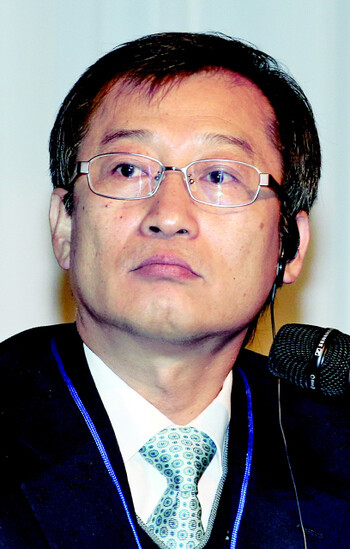
The recent rightward shift in Japanese opinion is raising concerns about the future, discussants said. One of the discussants, Pukyong National University professor Lee Jeong-ho, observed that young political leaders in Japan today are showing an especially strong conservative streak.
“The history textbooks that young people learn from are also written from a nationalist perspective,” he added.
“Leaders in both countries need to work step by step to lay the groundwork for an East Asian community,” Lee advised.
Moon also expressed concerns about the ideological shift.
“The Japanese people I know all came to prefer peace after the devastation of the atomic bombs on Hiroshima and Nagasaki, but it doesn‘t seem that way with Japan today,” he said.
Participants also noted the possibility of a shift in the regional order as China continues its rise and its relationship with the US changes.
“A tiger and a lion can’t live peacefully in the same cage,” said Song, likening South Korea and Japan to the proverbial “shrimp” that ends up with its back broken from discord between the two major powers, the US and China.
Hatoyama offered a somewhat different take.
“For all the talk about China and the US being the ‘lion and tiger,’ lions and tigers make a show of growling, but there have been close discussions between the US and Japan, Japan and China, and South Korea and China,” he observed.
“I don’t expect there to be any kind of war for power between the US and China,” he predicted.
Song noted that Washington and Beijing are involved in various forms of strategic dialogue, adding, “Strategic dialogue in international politics means continuing to talk for the sake of coexistence even when there are tricky issues at play.”
The conversation later shifted to the Nov. 16 election of Takeshi Onaka as governor of Japan’s Okinawa Prefecture after running on a platform of calling for the local US military base to be moved away.
“The key question is whether all the Japanese people will see it is their own issue. Many of them seem to speak of Okinawa as if it has nothing to do with them,” Hatoyama said.
“What this election showed is that Japanese people outside Okinawa need to open their eyes to democracy,” he added.
Moon argued that Japan needs to become “a country where an awakened public is in control.”
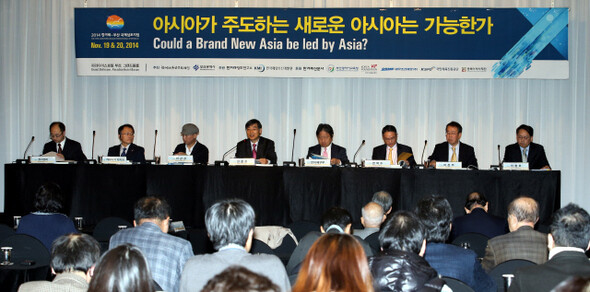
By Kim Oi-hyun, staff reporter in Busan
Please direct questions or comments to [english@hani.co.kr]

Editorial・opinion
![[Guest essay] The real reason Korea’s new right wants to dub Rhee a founding father [Guest essay] The real reason Korea’s new right wants to dub Rhee a founding father](https://flexible.img.hani.co.kr/flexible/normal/500/300/imgdb/original/2024/0423/8317138574257878.jpg) [Guest essay] The real reason Korea’s new right wants to dub Rhee a founding father
[Guest essay] The real reason Korea’s new right wants to dub Rhee a founding father![[Column] ‘Choson’: Is it time we start referring to N. Korea in its own terms? [Column] ‘Choson’: Is it time we start referring to N. Korea in its own terms?](https://flexible.img.hani.co.kr/flexible/normal/500/300/imgdb/original/2024/0423/3617138579390322.jpg) [Column] ‘Choson’: Is it time we start referring to N. Korea in its own terms?
[Column] ‘Choson’: Is it time we start referring to N. Korea in its own terms?- [Editorial] Japan’s rewriting of history with Korea has gone too far
- [Column] The president’s questionable capacity for dialogue
- [Column] Are chaebol firms just pizza pies for families to divvy up as they please?
- [Column] Has Korea, too, crossed the Rubicon on China?
- [Correspondent’s column] In Japan’s alliance with US, echoes of its past alliances with UK
- [Editorial] Does Yoon think the Korean public is wrong?
- [Editorial] As it bolsters its alliance with US, Japan must be accountable for past
- [Guest essay] Amending the Constitution is Yoon’s key to leaving office in public’s good graces
Most viewed articles
- 1[Column] ‘Choson’: Is it time we start referring to N. Korea in its own terms?
- 2Opposition calls Yoon’s chief of staff appointment a ‘slap in the face’
- 3[Guest essay] The real reason Korea’s new right wants to dub Rhee a founding father
- 4Senior doctors cut hours, prepare to resign as government refuses to scrap medical reform plan
- 5Why Korea shouldn’t welcome Japan’s newly beefed up defense cooperation with US
- 6New AI-based translation tools make their way into everyday life in Korea
- 7[Editorial] Japan’s rewriting of history with Korea has gone too far
- 8Terry Anderson, AP reporter who informed world of massacre in Gwangju, dies at 76
- 9[Column] Has Korea, too, crossed the Rubicon on China?
- 10[Column] The clock is ticking for Korea’s first lady